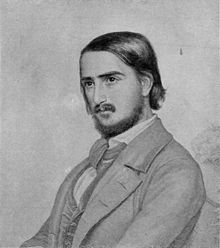fiction.wikisort.org - Writer
Georg Friedrich Rudolph Theodor Herwegh (31 May 1817 – 7 April 1875) was a German poet,[1] who is considered part of the Young Germany movement.

Biography
He was born in Stuttgart on 31 May 1817, the son of an innkeeper. He was educated at the Gymnasium Illustre of Stuttgart,[2] and in 1835 proceeded to the University of Tübingen as a theological student, where, with a view to entering the ministry, he entered the Protestant theological seminary. However, he found the strict discipline distasteful; he broke the rules and was expelled in 1836. He studied law for a short time, but decided to return to Stuttgart, and became editor of August Lewald's periodical Europa. Called out for military service, he had hardly joined his regiment when he became embroiled with a military officer with an act of insubordination,[3][4] and had to flee to Emmishofen, Switzerland in 1839.
His Gedichte eines Lebendigen ("Poems of a living man"[1]) were published in Zürich between 1841–1843 and immediately banned in Prussia. The lyrics combined revolutionary sentiment with a popular style and soon placed him at the forefront of the Vormärz revolutionary movement.[5] The fervent effusions of his poems became immensely popular, so that when, after a short trip to Paris, Herwegh journeyed through Germany in 1842, he was greeted with enthusiasm everywhere.
King Friedrich Wilhelm IV. gave him an audience, and assured him that he liked nothing better than an energetic opposition. But Herwegh overstepped all the bounds of conventionality in a letter to the King, and was hurried out of Prussia. At Zürich, he found no pleasant reception. But the king of Württemberg pardoned him for desertion from military service,[6] and in the canton of Basel, of which he now became a citizen, he married Emma Siegmund, daughter of a Jewish merchant at Berlin.[4] He next took up his abode in Paris, and wrote a second volume of Gedichte eines Lebendigen (1844). He also translated all of Lamartine into German (1843–1844).[6]
During the failed German revolution of 1848, together with a group of German emigrants, he led the German Democratic Legion in a military mission to Baden as part of the Hecker Uprising; with its defeat at Kadern, he had to flee to Switzerland once again.[1] He lived in Zürich; after an amnesty he moved to Baden-Baden, Germany. Herwegh wrote songs for Lassalle's Worker's Society and the Social Democratic Worker's Party. In 1877, Neue Gedichte was published. The most important work of his later years was the translation of many of Shakespeare's plays.[6] He died in Lichtental.
While other poets such as Ferdinand Freiligrath gave up their radical politics later on, Herwegh never changed his radical outlook and his commitment to radical democracy. He was disappointed by and criticised Prussian nationalism and Bismarck's war against France and annexation of Alsace-Lorraine in 1870–71. In Herwegh's mind, poetry is a first step towards political action, it should however not be artless. Consequently, he—like Heinrich Heine—defended Goethe.
References
- Herwegh, Georg, The Columbia Encyclopedia (2008)
- Wojak, Irmtrud (2009). Fritz Bauer 1903–1968: eine Biographie. Munich: C.H.Beck. p. 54. ISBN 978-3-406-58154-0.
- Chisholm, Hugh, ed. (1911). . Encyclopædia Britannica (11th ed.). Cambridge University Press.
- Rines, George Edwin, ed. (1920). . Encyclopedia Americana.
- Herwegh, Georg (1817–1875). The Crystal Reference Encyclopedia (2005)
- Gilman, D. C.; Peck, H. T.; Colby, F. M., eds. (1905). . New International Encyclopedia (1st ed.). New York: Dodd, Mead.
External links
- Website (in German) with a lot of information about the historical-critical edition of the poems and writings of Georg Herwegh;
- Works by or about Georg Herwegh at Internet Archive
- Works by Georg Herwegh at LibriVox (public domain audiobooks)

- Two photos of Georg Herwegh memorials at Liestal, Switzerland (in German) (search - Suchen - for “Herwegh”)
На других языках
[de] Georg Herwegh
Georg Friedrich Rudolf Theodor Andreas Herwegh (* 31. Mai 1817 in Stuttgart; † 7. April 1875 in Lichtental)[1] war ein revolutionärer gebürtiger deutscher Dichter des Vormärz und Übersetzer, der auf eigenen Wunsch ab 1843 auch die Schweizer Staatsbürgerschaft hatte. Im 19. Jahrhundert war er neben Heinrich Heine und Ferdinand Freiligrath einer der populärsten deutschsprachigen politischen Lyriker[2] und neben Georg Weerth einer der bedeutendsten mit der deutschen Arbeiterbewegung verbundener Dichter.- [en] Georg Herwegh
[es] Georg Herwegh
Georg Friedrich Rudolph Theodor Herwegh (31 de mayo de 1817 - 7 de abril de 1875) fue un poeta alemán.[fr] Georg Herwegh
Georg Friedrich Rudolph Theodor Herwegh (Stuttgart, 31 mai 1817 - Baden-Baden, 7 avril 1875), est un poète, révolutionnaire et traducteur wurtembergeois.[ru] Гервег, Георг
Георг Гервег (Георг Хервег, нем. Georg Friedrich Rudolph Theodor Herwegh, 31 мая 1817, Штутгарт — 7 апреля 1875, Баден-Баден) — немецкий революционно-демократический поэт и публицист.Другой контент может иметь иную лицензию. Перед использованием материалов сайта WikiSort.org внимательно изучите правила лицензирования конкретных элементов наполнения сайта.
WikiSort.org - проект по пересортировке и дополнению контента Википедии